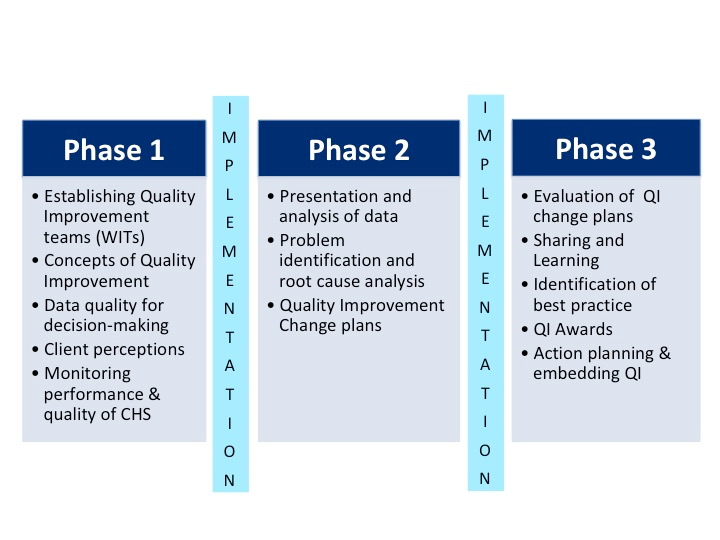Quality Improvement
Our Quality Improvement approach was developed and tested by the REACHOUT Consortium and involves a five-step process: Plan, Define, Monitor, Improve, Evaluate. Quality improvement is a way of studying and providing health services which is user focused and aims to systematically improve delivery in line with evidence.

Phase one: Establishment of Work Improvement Teams, who attend a three-day training workshop covering:
- Core concepts of quality assurance and quality improvement and its application to the context of community health services
- The importance of data quality and how to conduct Data Quality Assessments of community-level health data to compare the values reported for specific performance indicators by Community Health Volunteers, Community Health Extension Workers and in the national health information system
- The Community Follow-Up Tool, designed by the USAID SQALE program team addresses a gap in the Community Health Strategy which relates to capturing communities’ experience and satisfaction with delivery of community health services. The Community Follow-Up Tool captures what actually happens between the Community Health Volunteer and household member during a household visit. It measures perceptions of and satisfaction with Community Health Volunteer activities, their communication skills and referrals to and experience at healthcare facilities. It is administered by a community member appointed by the WIT
This is followed by a period of implementation of their learning, supported by coaches whose role is described below.
Phase two: Work Improvement Teams attend a three-day training workshop to which they brought routine community health information system data, Data Quality Assessment results and Community Follow-Up Tool results. Using all these different data sources, the Work Improvement Teams then worked through the first three steps of the quality improvement cycle which are: identification, prioritisation and definition of problems; root cause analysis; and development of solutions to overcome the problem using a Quality Improvement Change Plan. The Work Improvement Teams implement and test their Quality Improvement Change Plans for a period of four to six months, supported by coaches and peers in other Work Improvement Teams.
Phase three: This constituted a learning event in which Work Improvement Teams from different sites were brought together to present and evaluate their progress in implementing their Quality Improvement Change Plans through poster presentations and using other interactive methods. Learning events provide an important space for reflection and evaluation involving managers, supervisors, providers and community members. A key aim of such events is to recognise high-performing teams and innovative changes, to consolidate learning and share best practice in the application of quality improvement approaches, and to identify common enablers and barriers in embedding quality improvement in the Community Health Strategy. Quality improvement innovation awards have also been introduced to motivate teams and create a sense of friendly competition. Learning events take place on a six-monthly basis so that teams do not lose momentum and continue to learn from one another.
Throughout this process, quality improvement coaching is essential. Under the USAID SQALE model County and Sub-County Health Management Team members take on the role of Quality Improvement Coaches for community health services. A coach plays three main roles: facilitator, trainer and quality improvement expert. They make visits to the meetings of the Sub-County Work Improvement Teams for Community Health Services, to provide technical assistance and guidance, constructive feedback and moral support. The purpose of this coaching is to enable Work Improvement Teams to confidently use and apply quality improvement tools and improve retention, performance and motivation of Community Health Volunteers through recognition that they truly are a part of the larger healthcare system which has promoted an innovative work environment.
The USAID SQALE program has also supported regular coaches’ meetings to allow Work Improvement Teams and coaches to share their progress and lessons in best practice as well as collectively analyse routine community-level health data to generate information that is used for decision-making.